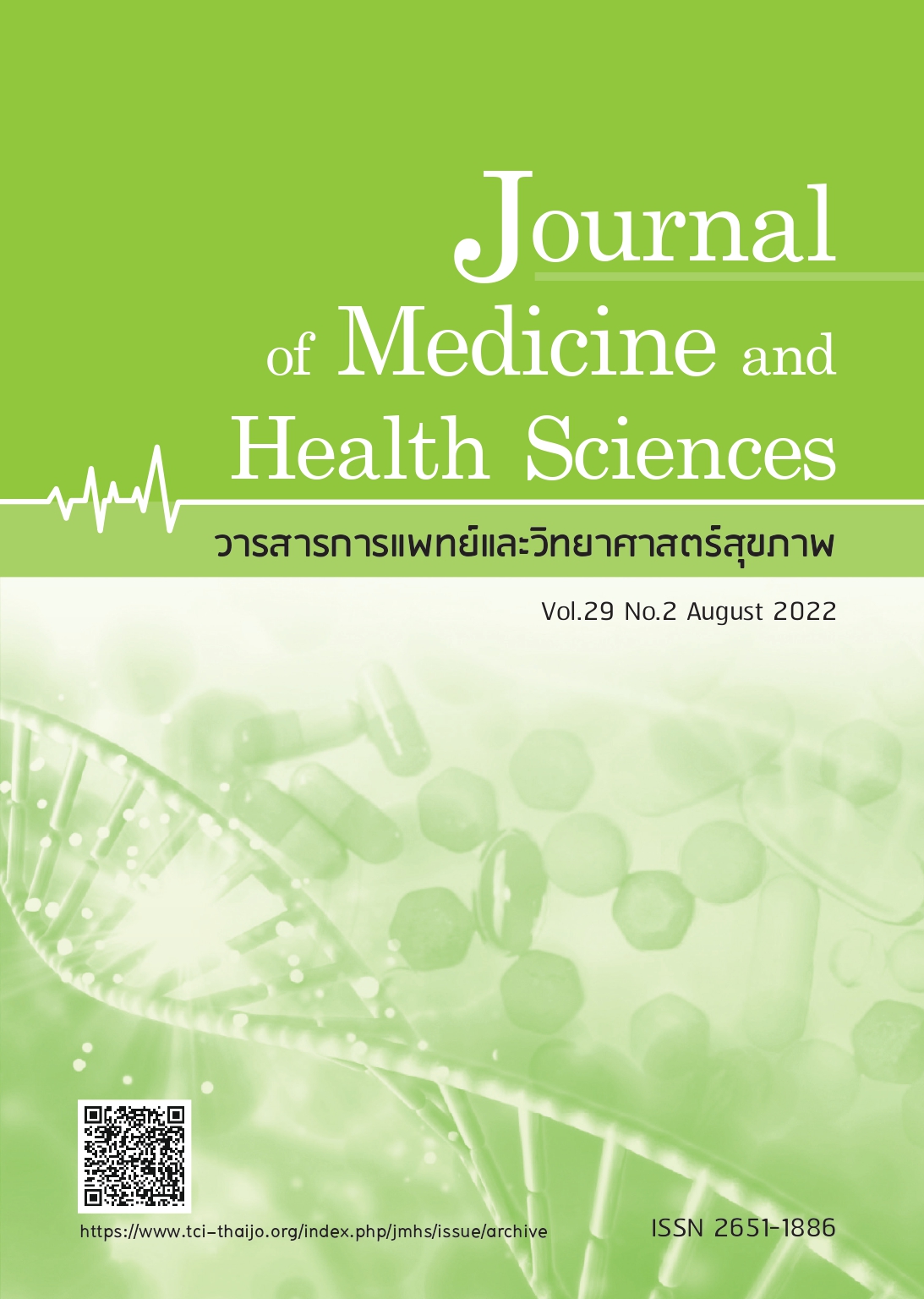การศึกษาภาวะผิวหนังอักเสบ ภายหลังยกเลิกการใช้ถุงมือยางทางการแพทย์ชนิดมีแป้ง ในบุคลากรทางการแพทย์ของห้องผ่าตัด
คำสำคัญ:
ถุงมือลาเท็กซ์, ผิวหนังอักเสบ, แพ้ลาเท็กซ์, แพ้ถุงมือ, บุคลากรทางการแพทย์บทคัดย่อ
บทคัดย่อ
ภาวะผิวหนังอักเสบจากการใช้ถุงมือเป็นภาวะที่พบได้บ่อยในบุคลากรทางการแพทย์ โดยสามารถแบ่ง ภาวะดังกล่าวออกเป็น 2 ประเภท ได้แก่ ภาวะผิวหนังอักเสบจากถุงมือชนิดแพ้สัมผัส และชนิดระคายสัมผัส การ สัมผัสถุงมือลาเท็กซ์ชนิดมีแป้งเป็นหนึ่งในปัจจัยสำคัญที่ก่อให้เกิดภาวะดังกล่าวได้ การศึกษานี้เป็นการวิจัยกึ่ง ทดลอง เพื่อศึกษาความสัมพันธ์ของสัดส่วนที่ลดลงของผู้ปฏิบัติงานพยาบาลห้องผ่าตัดที่มีภาวะผิวหนังอักเสบ จากถุงมือ ภายหลังงดการใช้ถุงมือลาเท็กซ์ชนิดมีแป้ง และทดแทนด้วยถุงมือยางสังเคราะห์เป็นระยะเวลา 3 เดือน ณ ห้องผ่าตัดของโรงพยาบาลมหาวิทยาลัยแห่งหนึ่งในภาคตะวันออกเฉียงเหนือ โดยระหว่างงดการใช้ถุงมือ ลาเท็กซ์ชนิดมีแป้งดังกล่าว ยังคงมีการใช้ถุงมือลาเท็กซ์ชนิดไร้แป้ง และชนิดไร้แป้งโปรตีนต่ำ ดำเนินการเก็บข้อมูลด้วยการใช้แบบสอบถามชนิดตอบเอง ผลการศึกษาพบว่า มีอัตราการตอบกลับแบบสอบถามคิดเป็นร้อย ละ 78.3 ความชุกของบุคลากรที่มีภาวะผิวหนังอักเสบจากการใช้ถุงมือก่อนและหลังการเปลี่ยนไปใช้ถุงมือยาง สังเคราะห์คิดเป็นร้อยละ 17.8 (95%CI 11.7 - 24.5) และ 4.9 (95%CI 1.8 - 8.6) ตามลำดับ และมีความแตก ต่างของความชุกอยู่ที่ร้อยละ 12.9 (95%CI 8.6 - 17.8) โดยในระยะก่อนการเปลี่ยนไปใช้ถุงมือยางสังเคราะห์ พบว่ามีผู้ที่มีภาวะผิวหนังอักเสบจากการใช้ถุงมือชนิดแพ้สัมผัสคิดเป็นร้อยละ 8.6 และชนิดระคายสัมผัสคิดเป็น ร้อยละ 14.7 ในขณะที่ภายหลังการใช้ถุงมือยางสังเคราะห์ พบภาวะดังกล่าวลดลงเหลือเพียงร้อยละ 2.5 และ ร้อยละ 3.7 ตามลำดับ ทั้งนี้พบว่า ภาวะผิวหนังอักเสบจากการใช้ถุงมือลดลงอย่างมีนัยสำคัญทางสถิติเมื่อเปรียบ เทียบระหว่างก่อนและหลังงดการใช้ถุงมือลาเท็กซ์ชนิดมีแป้ง (OR 0.24, 95%CI 0.1 - 0.53) ทั้งชนิดแพ้สัมผัส (OR 0.27, 95%CI 0.075 - 0.8) และชนิดระคายสัมผัส (OR 0.22, 95%CI 0.08 - 0.54) กล่าวโดยสรุปคือการ ใช้ถุงมือลาเท็กซ์ชนิดมีแป้งสัมพันธ์กับการเกิดภาวะผิวหนังอักเสบ การงดการใช้ถุงมือลาเท็กซ์ชนิดมีแป้งดังกล่าวสามารถลดการเกิดภาวะผิวหนังอักเสบจากการใช้ถุงมือในผู้ปฏิบัติงานพยาบาลได้
เอกสารอ้างอิง
Mekonnen TH, Yenealem DG, Tolosa BM. Self-report occupational-related contact dermatitis: prevalence and risk factors among healthcare workers in Gondar town, Northwest Ethiopia, 2018—a crosssectional study. Environ Health Prev Med 2019;24(1):11.
Anderson SE, Meade BJ. Potential health effects associated with dermal exposure to occupational chemicals. Environ Health Insights 2014 Dec 17;8(Suppl 1):51-62.
Stingeni L, Lapomarda V, Lisi P. Occupational hand dermatitis in hospital environments. Contact Dermatitis 1995;33(3):172–6.
Kurpiewska J, Liwkowicz J, Benczek K, et al. A survey of work-related skin diseases in different occupations in Poland. Int J Occup Saf Ergon 2011;17(2):207–14.
Meyer JD, Chen Y, Holt DL, et al. Occupational contact dermatitis in the UK: a surveillance report from EPIDERM and OPRA. Occup Med 2000;50(4):265–73.
Chern A, Chern CM, Lushniak BD. Chapter 27: occupational skin diseases. In: Kang S, Masayaki A, Bruckner AL, Enk AH, Margolis
DJ, McMicheal AJ, et al. Fitzpatrick’s Dermatology. 9th ed. New York: McGrawHill, Medical Pub. Division;2019. Accessed April 18,2022.https://accessmedicine. mhmedical.com/content.aspx?bookid= 2570§ionid=210414623
Lampel HP, Powell HB. Occupational and hand dermatitis: a practical approach. Clin Rev Allergy Immunol 2019;56(1):60–71.
Bains SN, Nash P, Fonacier L. Irritant contact dermatitis. Clin Rev Allergy Immunol 2019;56(1):99–109.
Stingeni L, Lapomarda V, Lisi P. Undesirable effects from latex gloves in hospital healthcare personnel. J Eur Acad Dermatol
Venereol 1996;7(1):44–8.
Brehler R, Voss W, Muller S. Glove powder affects skin roughness, one parameter of skin irritation. Contact Dermatitis 1998;39(5):227–30.
Hollins LC, Flamm A. Occupational contact dermatitis. Dermatol Clin 2020;38(3):329–38.
Wiszniewska M, Walusiak-Skorupa J. Recent trends in occupational contact dermatitis. Curr Allergy Asthma Rep 2015;15(7):43.
Turner S, McNamee R, Agius R, et al. Evaluating interventions aimed at reducing occupational exposure to latex and rubber glove allergens. Occup Environ Med 2012;69(12):925–31.
Kiely LF, Moloney E, O’Sullivan G, et al. Irritant contact dermatitis in healthcare workers as a result of the COVID-19 pandemic: a cross-sectional study. Clin Exp Dermatol 2021;46(1):142–4.
Edelstam G, Arvanius L, Karlsson G. Glove powder in the hospital environment – consequences for healthcare workers. Int Arch Occup Environ Health 2002;75(4):267–71.
Boonchai W, Sirikudta W, Kasemsarn P. Characteristics of latex glove usage and glove-related symptoms among health care workers in each work sector of a university hospital. J Med Assoc Thai 2017;100(5):7.
Boonchai W, Sirikudta W, Iamtharachai P, et al. latex glove–related symptoms among health care workers: a self-report questionnaire-based survey. Dermatitis 2014;25(3):135–9.
Royal Gazette. Notification of the Ministry of Public Health RE: Prohibition of Produced, Sold, or Imported Surgical Powdered Latex Gloves B.E. 2563 (2020); Bangkok.
Chaiear N, Med M, Jindawong B, et al. Glove allergy and sensitization to natural rubber latex among nursing staff at Srinagarind hospital, Khon Kaen, Thailand. J Med Assoc Thai. 2006;89(3):9.
Kersh AE, Helms S. Glove-related allergic contact dermatitis. American Contact Dermatitis Society 2018;29(1):9.
Murphy PB, Atwater AR, Mueller M. Allergic Contact Dermatitis. [Updated 2021 Sep 20]. In: StatPearls [Internet]. Treasure Island (FL): StatPearls Publishing; 2022. Available from: https://www.ncbi.nlm.nih. gov/books/NBK532866/
Rattanarak A, Chaiear N, Sakdapipanich J, et al. An uncommon outbreak of irritant contact dermatitis caused by rubber accelerators: a historical cohort study. J Rubber Res 2019;22:145–52
Edelstam G, Arvanius L, Karlsson G. Glove powder in the hospital environment - consequences for healthcare workers. Int Arch Occup Environ Health 2002;75(4):267-71.
Larese Filon F, Bochdanovits L, Capuzzo C, e. Ten years incidence of natural rubber latex sensitization and symptoms in a prospective cohort of health care workers using non-powdered latex gloves 2000- 2009. Int Arch Occup Environ Health 2014;87(5):463-9.
Jacobsen G, Rasmussen K, Bregnhøj A, et al. Causes of irritant contact dermatitis after occupational skin exposure: a systematic review. Int Arch Occup Environ Health 2022;95(1):35–65.
Hamnerius N, Svedman C, Bergendorff O, et al. Wet work exposure and hand eczema among healthcare workers: a cross-sectional study. Br J Dermatol 2018; 178(2):452–61.
Crepy MN, Lecuen J, Ratour-Bigot C, et al. Accelerator-free gloves as alternatives in cases of glove allergy in healthcare workers: accelerator-free gloves in rubber glove allergy. Contact Dermatitis 2018; 78(1):28–32.
Nettis E, Colanardi MC, Soccio AL, et al. Occupational irritant and allergic contact dermatitis among healthcare workers. Contact Dermatitis 2002;46(2):101–7.
Stocks SJ, McNamee R, Turner S, et al. The impact of national-level interventions to improve hygiene on the incidence of irritant contact dermatitis in healthcare workers: changes in incidence from 1996 to 2012 and interrupted times series analysis. Br J Dermatol 2015;173(1):165–71.
Ogawa-Fuse C, Morisaki N, Shima K, et al. Impact of water exposure on skin barrier permeability and ultrastructure. Contact Dermatitis 2019;80(4):228–33.
Johansson E, Hershey GKK. Contribution of an impaired epithelial barrier to the atopic march. Ann Allergy Asthma Immunol 2018;120(2):118–9.
ดาวน์โหลด
เผยแพร่แล้ว
รูปแบบการอ้างอิง
ฉบับ
ประเภทบทความ
สัญญาอนุญาต

อนุญาตภายใต้เงื่อนไข Creative Commons Attribution-NonCommercial-NoDerivatives 4.0 International License.



